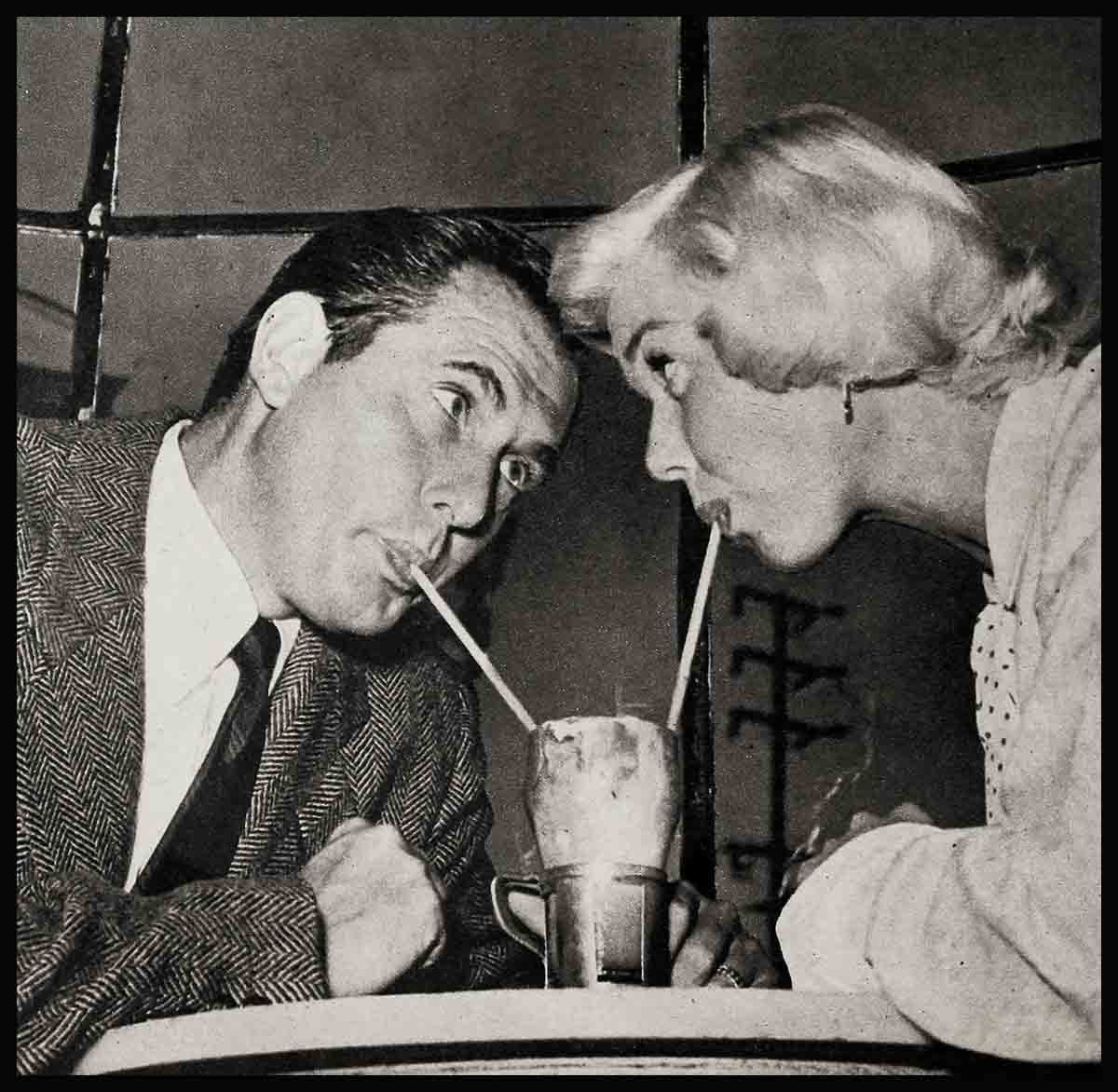
Happy Talk—Doris Day
During the recent shooting of one of the big Doris Day musicals at Warner Brothers’ Studio, some out-of-town visitors dropped in on the set. It was in the middle of a very complicated musical number in which Doris and a couple of the other principals were required to interrupt their singing and dancing to put across a plot point. This is at best a harrowing procedure, for it involves cues for the actors, cameramen and technicians that must be hit right on the button. The timing, in other words, must be exact to the finest degree.
Nobody ever shoots a scene like this right the first time. As a matter of fact, 10 or 20 times is sometimes required before the scene is satisfactory to both the director and the cameraman. This shot, however, was a real toughie and it was shot again and again and again. As the hours wore on the visitors sat and waited, just, maybe, to see what would finally happen. The director was a nervous wreck. The leading man looked like a lunatic wanting to burst from his cage. The photographer seemed about to go right through the roof at any moment. But Doris Day just smiled and tried again every time she was asked to. She did each take with a smile, the same sort of smile she wore the first time. Finally one of the visitors turned to their guide.
“What’s the matter with her?” he asked. “Hasn’t she got any nerves? Doesn’t she ever explode?”
The guide looked puzzled for a moment. “No,” he said. “I guess she doesn’t. Say, that’s kind of funny.”
You’re doggone right it’s kind of funny. It’s just about as odd as a star working for nothing. It’s something that has seldom been seen on a sound stage before. But it is no miracle. It is just that Doris Day is happy. She’s found a peace, an ability to live with herself and others that is superior. There are those who say she has found religion, but that is only part of it. She has learned the secret of patience, and it is one of the main reasons why she is a star today. It is one of the main reasons she will go on and on while other stars fall or become victims of bad habits, greed and self-adulation.
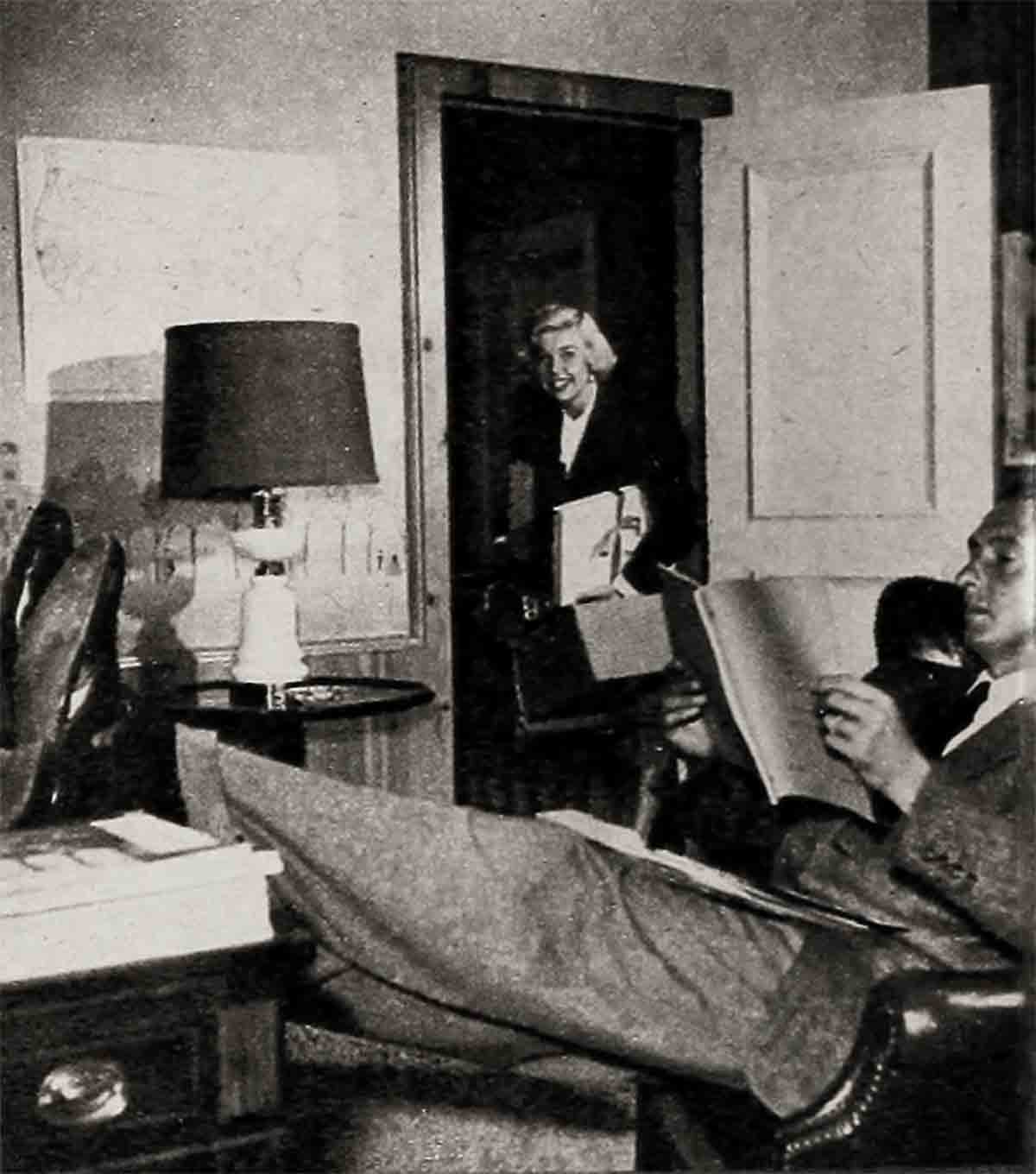
It was a gradual process. When Doris Day first came to the movies she was as anxious as most newcomers who break into pictures are. She had been a band singer for years. A girl who had made a living by moving from one town to another every day of the year. A girl who had dressed in washrooms, slept for weeks in the back seat of a bus, and who had to get before a milling throng of strangers at each stop and sing warmly about love, or whip herself into a tizzie with a jump song she’d sung a thousand times. In other words, she was a fake by profession. A performer, but never actually in the mood she pretended to be.
When she first came to Hollywood, Doris was pretty bitter about life. She was married to a young fellow who was a musician with one of the bands she had.sung with and they were broke. Instead of staying at a swank hotel, as most performers dream they will do when they get to Hollywood, Doris and her husband, George Weidler, parked a trailer in a vacant lot in the San Fernando Valley. When they put out feelers for work, they had to trust to the kindness of a nearby store for a telephone communication in case an offer of a job came through.
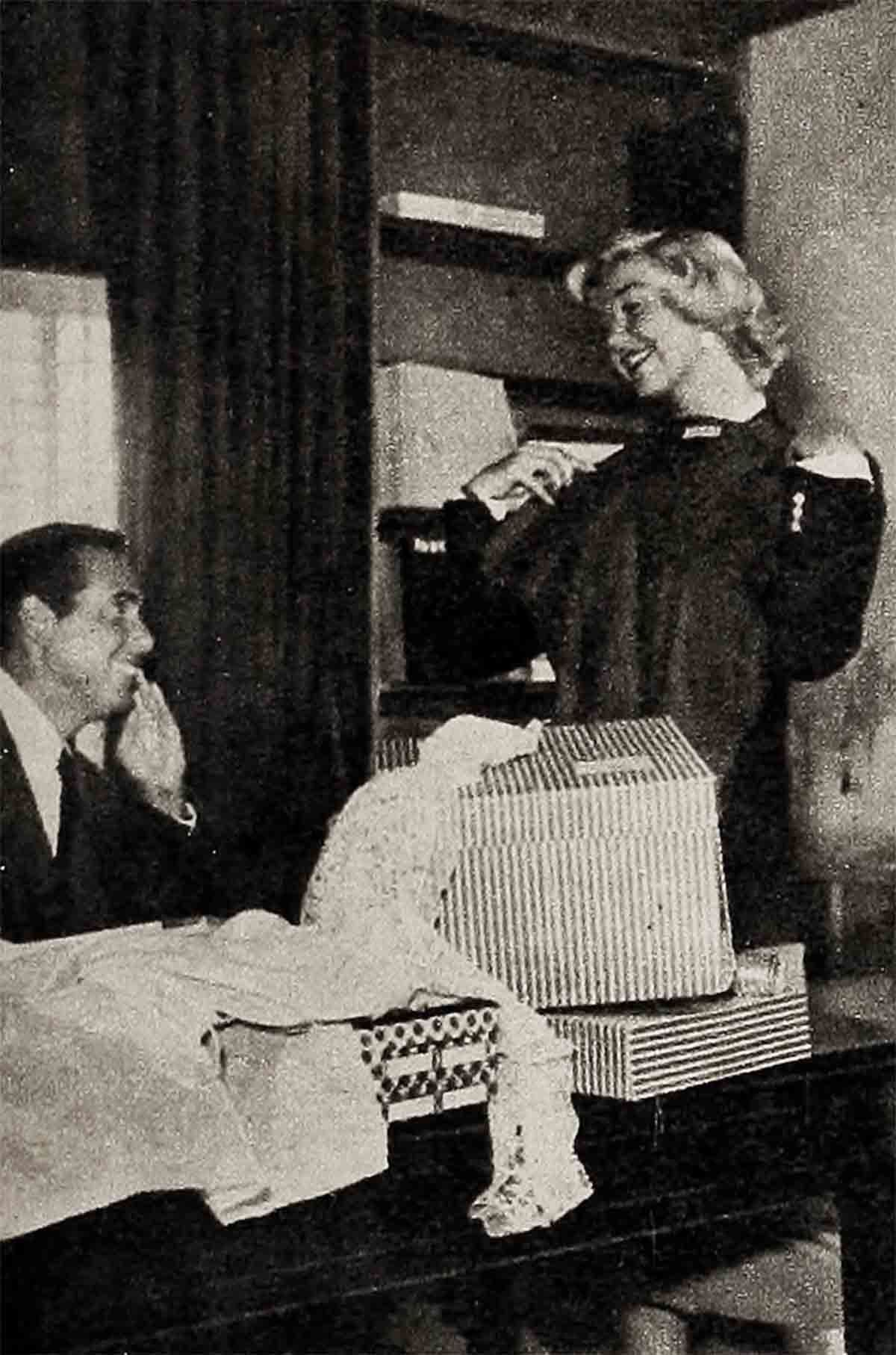
Doris, of course, had that famous smile even then. The broad grin with the white teeth was a trademark, and she was able to flash it on no matter what the situation. you’d have seen that in repose the smile seldom appeared. And as the weeks went by and no sign of even a night club date appeared, let alone the movies, the smile appeared less and less often.
A few months after she had been in California, a crisis suddenly confronted Doris. Her marriage to George, which was her second try at wedlock, was no go. Nothing went right. George was not staying with her as much as he should have. They were too poor, even for the skimpy budget they had set for themselves. So one night Doris walked away from the trailer, and took a small room in a low-priced Hollywood hotel.
The chance she had been waiting for came shortly after that. A call came from her agent, a fellow by the name of Al Levy who obviously had a faith in her talent that he shared with no one else. He called her at the hotel when she was at her lowest ebb, almost at the bottom.
“Meet me at nine o’clock tomorrow morning,” he said. “We’re going out to Warner Brothers.”
Doris was facing a mirror as she took the call. She saw reflected a tall, rather plain girl with corn silk hair, a nose too small, and worst of all a face covered with freckles. She didn’t think it was a glamorous picture.
“Warner Brothers!” She said. “What for?”
“We’re going to make a test, Dope,” said Levy.

“A test!” Said Doris. You sure you’ve got the right girl?”
“Just be ready,” said Levy, and hung up.
The next morning Al Levy swung Doris Day through the front gate of the Warner Brothers Studio and she felt like a fool. She was making a big mistake she thought, walking into an obvious insult. Who would hire a girl like her for the movies?
The test was made by Michael Curtiz, the director who at that time was the toast of the town for his recent picture, Casablanca. He put Doris through her paces. In spite of his consideration and tact she was sure he hated her and was just too polite to offend her. She admitted later that she thought for a time that there was no film in the camera. Why waste film on somebody who was quite visibly not the type.
Doris left the studio with a sigh of relief and vowed she’d never set foot in another. She tried to get the whole thing out of her mind and went back to the daily grind of trying to line up a deal with a band, or get solo singing engagements. She was truly astonished her again and said they were wanted at the studio.
“Horrors,” she thought, “they probably want to make me pay tor the money they spent on the test.” Levy took her straight to Curtiz’ office. The director sat behind his desk and looked at her a long time without speaking.
“Have you ever had any dramatic experience?” he asked finally.
“No, sir,” said Doris.
“Hmmmm,” said Curtiz. “Very good. Have you ever taken lessons in acting?”
“No, sir,” said Doris.
“Good. Good,” said Curtiz.
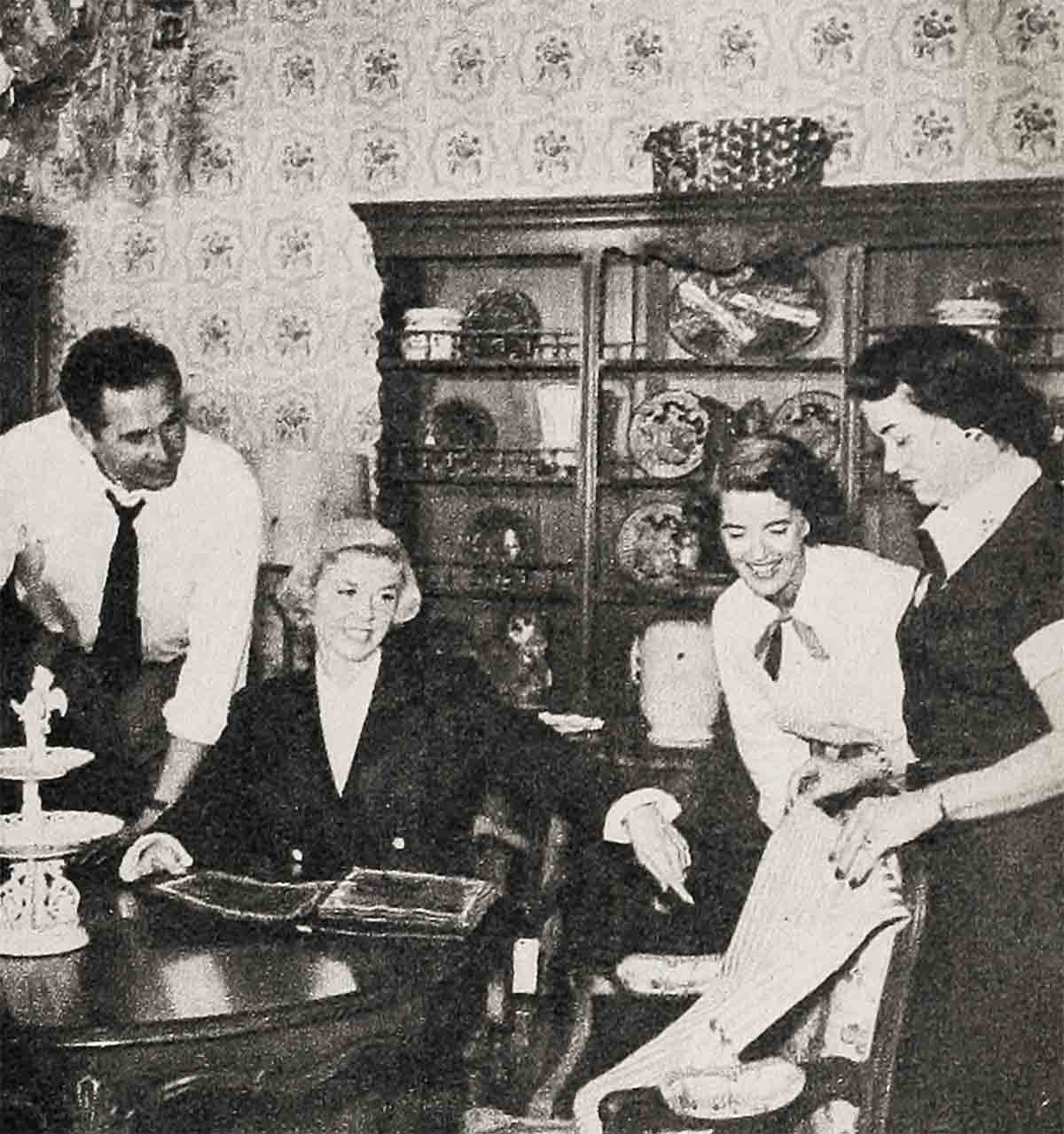
Then he turned to the agent. “People,” he said, “are going to say that I am crazy, but I will sign this girl to a personal contract and give her the leading role opposite Jack Carson in the picture I am preparing.”
Doris sat ashen-faced and listened. She was sure she was not hearing right. Then she got up from the chair and walked from the studio in a daze. When she got home, she sat alone in her room for hours, not even answering the phone, trying to figure out what strange trick life was getting ready to play on her now.
Now, this is not a story about how Doris Day became a star in pictures. That has been told many times. But it is proper to repeat that while she was a smash hit from the beginning, and that after awhile Warner Brothers bought her contract from Curtiz for a pretty penny. She’s been their top star ever since. But all of the time the smile was a prop, the cheery attitude a fake. Doris Day was not really happy down deep in her heart.
If you’ll remember back to those days, you’ll recall that Doris was pretty much a play girl. She spent most of her time with Jack Carson, a fellow who likes nothing better than an evening on the town, in the night clubs and with gay companions. When they weren’t working, they rested up during the day and made the rounds at night. Neither of them could have been called excessive drinkers or dissipaters in any form, but they lived a gay existence. Although the whole town thought they were in love and would some day marry, they themselves never thought they were even mildly in love.
By the time Doris Day was ready for happiness she had had everything else she wanted. She was a big star, used to the adulation and the big money. She radiated confidence that it would go on forever. But inwardly she was filled with doubts. She was like a person attending a costume party in a get-up that she really didn’t belong in. Accepted, but knowing that the whole thing was a gag. When she was alone at night, before she went to sleep, Doris used to lie awake and count her blessings and evaluate her shortcomings. It was in those hours that she grew frightened and dreaded the thought of what tomorrow would bring.
The salvation of the old Doris Day, and the birth of the new, came about in a strange way. She hadn’t seen her husband for quite a while. They were divorced, held no grudges, but neither did they share confidences. One day he called and said he had a couple of things they ought to talk over. Doris agreed to meet him.
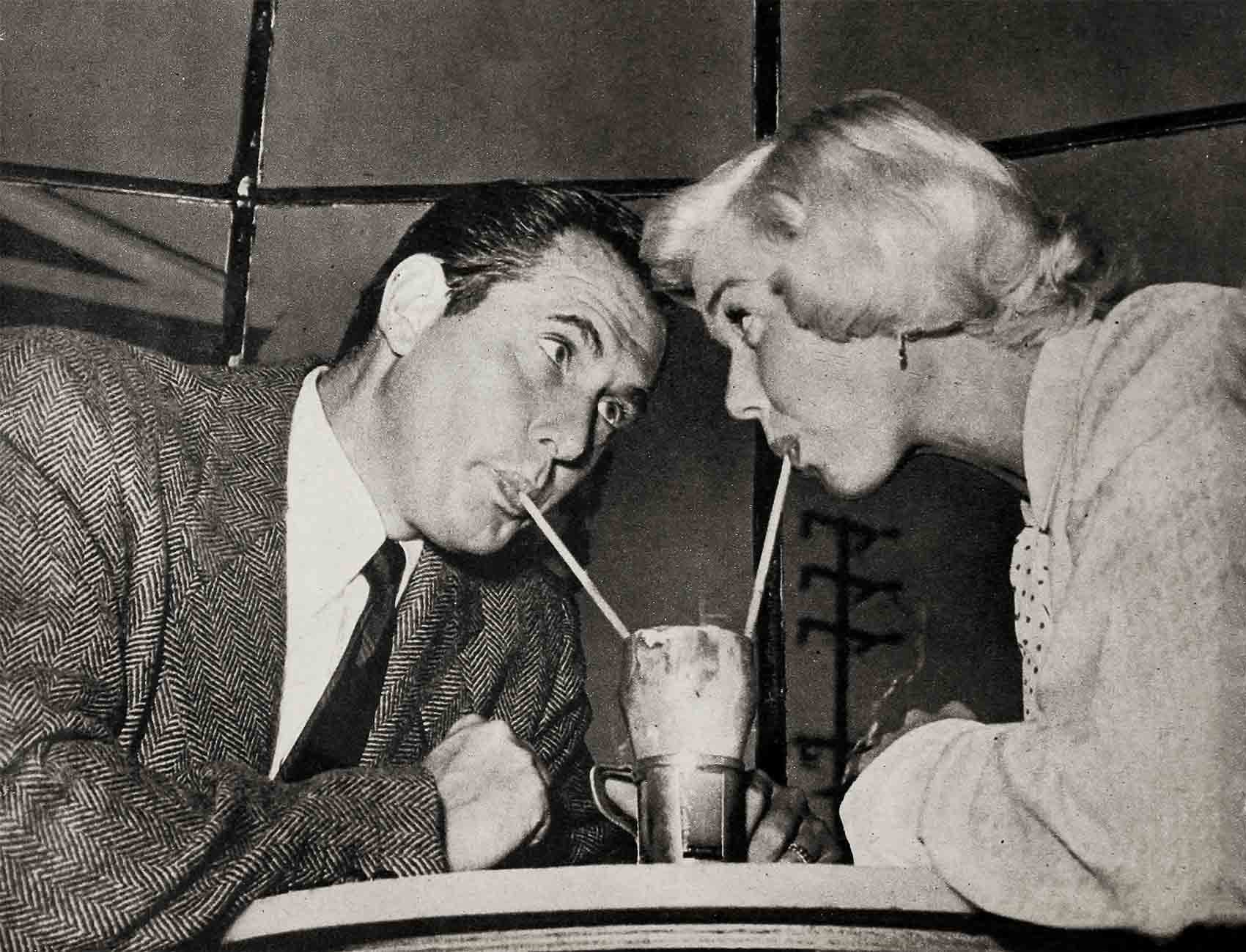
Doris has said since then that seeing the transformation in George Weidler was one of the big shocks of her life. George, the fellow who lived for the kicks of today, the lad with the often sad and worried look, the boy with no taste for responsibilities of any kind stood before her and looked like a stranger. He stood erect and sure of himself. His face was serene and purpose was in his eyes. When he spoke he said something. Just what he meant. And his kindness in dealing with the mutual problem they faced was as surprising as his changed appearance.
Their business concluded, George was about to go, but Doris wouldn’t let him.
“Something’s happened to you,” she said. “I don’t know what it is, George, but something’s happened to you that I wish could happen to me. You’re strong, and I always thought I was the strong one.”
George smiled and sat down again. “Would you like me to tell you about it?” he asked.
“Please tell me,” Doris begged.
They sat and talked for a long time. George had discovered a religious science—that maybe wasn’t altogether a religion or a science—but a way of life. He had found it when he needed it most, and it had made him happy for the first time that he could remember. Doris wanted to know how she could get to know about it and he told her, told her how to approach it, where to read about it and what it would do for her. She walked away from that meeting determined to get off the Hollywood merry-go-round and look for some of the peace she had thought she’d find if she ever got financial security.
A number of things that happened to Doris after that seemed to impel her toward a state of peace. Small things at first, but all part of a pattern that was to change her life completely.
Then she received a blow where it hurt most. She developed a bad throat, and she earned a living with her throat. She went to a doctor and had an examination. There was nothing very dangerous about her condition, he told her, but she would have to remain silent for a long time and later on an operation might be required.
In the cold light of day, when Doris left the doctor’s office, she took stock of herself once more and decided that rather than agree to the diagnosis and curtail her work—which was the only thing she really loved about her life—she would fight it out within herself. She trembled a little as she got into her car and lit a cigarette with nervous fingers. Suddenly she looked at the cigarette. And then she threw it as far away as she could. She has never smoked a cigarette since. She whipped the trouble with her throat, and it has never returned.
The same thing happened with liquor. While she was never a heavy drinker, Doris Day was like most people in Hollywood, a slave to the cocktail habit. Cocktails before lunch, maybe, and a cocktail before dinner. If she had to meet someone late in the afternoon, it was, naturally, for cocktails. As she began to find peace easier through her study of the new way of life she had discovered, Doris came to the conclusion that the cocktail was an enemy of the calm she wanted. She decided at a cocktail party one afternoon, after looking at what was happening to the rest of the people there, to put down her glass and she has never, to this day, lifted another.
The third thing that happened to Doris Day during her search for peace was a man. She had long before stopped making the gay rounds with Jack Carson. And, to tell the truth, she was lonely. Although she had always dealt exclusively with Al Levy in her agent’s office, she had met another young fellow who was a partner there by the name of Marty Melcher. Melcher was a tall, rather esthetic type of fellow, quiet and not too friendly. One day Levy was out of town and he asked Melcher to escort Doris to a radio program she was booked for.
After the show Doris and Marty went to a restaurant for a bite to eat. They sat and talked for quite a while, and Doris was quite taken with the quiet manner of the man. And Marty was a bit more cordial than usual. They both wanted to meet a second time, so they did the day after. That was really when they had their first serious conversation. Doris told Marty about the new thing she was finding in her life. And he told her that he had been in a very unhappy state because of a separation from his wife and was seeking the same refuge.
It might have been decided that night that Doris Day and Marty Melcher would be together forever, but, of course, neither of them knew it. They did know, though, that they thought alike and were kindred souls in a strange environment. They met again and again. Soon the gossipers were saying they were in love. If they were, they didn’t know it, but they did know that they had a common purpose, to achieve the serenity they knew possible in their spiritual life.
A lot of water has passed under the bridge since that day. Now Doris and Marty are married, after one of the most casual courtships known in Hollywood. There was never any of the mad chasing that is so common in Filmtown when a man is after a girl. They just sort of drifted toward one another. They found not only comfort but solace in one another’s company—and peace in their mutual search for something and someone to believe in.
Now, there is nothing in life that can hurt Doris Day. She is one of the best-adjusted actresses in Hollywood, and there is no better wife and mother. Her home is a haven for the friends they want, They are the staunch confidants of practically all of the kids in the neighborhood.
Those visitors to the set of that Warner Brothers musical thought they were seeing a great example of control when they saw Doris Day go through a work-a-day experience that had everyone else in the company tearing at their hair. But they really were not. They were just watching a girl work who has found peace, a true, deep, abiding peace.
Doris Day will go a longer way than she ever might have before. You see she knows herself completely, and she knows exactly where she’s going.
THE END
—BY STEVE CRONIN
(Doris Day will soon be seen in Warner Brothers’ April In Paris.)
It is a quote. MODERN SCREEN MAGAZINE DECEMBER 1952





No Comments